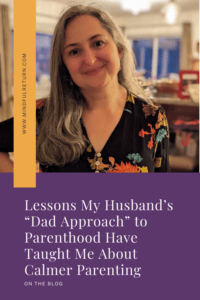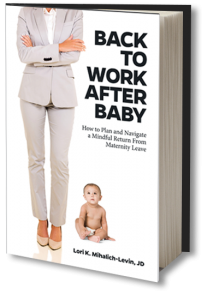 If you have a husband or wife, or spouse or partner, it may be that you and “your person” in life have different approaches to how you parent. Frankly, I’d be shocked if you didn’t, given partners are two independent human beings with fully-formed adult opinions and experiences!
If you have a husband or wife, or spouse or partner, it may be that you and “your person” in life have different approaches to how you parent. Frankly, I’d be shocked if you didn’t, given partners are two independent human beings with fully-formed adult opinions and experiences!
Sometimes these differences between partners drive us bonkers. And other times they cause light bulbs to go off in our own heads. “Maybe, just maybe, there’s another way to approach this situation!” we might dare to think, when we pause to reflect on our partner’s way of doing things.
Today, I’m delighted to welcome to this space a Mindful Return alum who has given a lot of thought to the ways she and husband can learn from one another in parenthood. Jane Yamaykin, mama to a preschooler and twin toddlers, is here today to share the lessons she learned from paying attention to the “dad approach” in her home. Thank you, Jane, for sharing your wisdom with the Mindful Return community!
***********************************
At 6:02am on Wednesday, December 26, 2018, a tiny human I grew with my own body for 39 weeks and a day was placed on my chest, and I became a parent. Thus began the steepest learning curve I have ever experienced. The realities of this singular event are still sinking in nearly five years later. Although it was certainly possible to think through the ramifications during pregnancy or even prior, nothing could have fully prepared me. Every role I hold has now shifted in some way: wife/partner, daughter, friend…
Although I had a relatively easy pregnancy and felt attached to my baby before ever meeting him, it was far more challenging feeling attached once the realities of caring for his every need were fully upon us. And we are very lucky. His temperament from the beginning was sweet and easy going. He was rarely fussy and an OK sleeper. Still, we faced our fair share of challenges early on. And I quickly found myself falling for the same traps many new moms fall into. Especially those of us who are inclined towards perfectionism – which of course has no place in parenthood.
One of the most surprising and wonderful realizations I had in our first few weeks home with E (my oldest) was that although I struggled to feel euphoria with my newborn, I fell deeper and deeper in love with my partner. I always knew he would be an incredible father. And watching him in action and so in love with our son filled me with a bursting sense of happiness. Breastfeeding and my body seemed to be incompatible. Yet I slogged onward through clogged ducts, mastitis (twice!), and other countless painful obstacles, which I insist were at times more painful than childbirth. This made my bonding with baby emotionally more complicated. While at the same time, I watched with fascination as my husband seemingly seamlessly made the transition into parenthood.
Along the way, I realized there were important differences in how my husband and I approached our newborn. Ultimately, I chose to find sanity in his approach, rather than begrudge him for it as so many other moms I know have done. And I admit I initially did as well.
There’s a catch-22 for moms today. We’re finally being told to put on our own oxygen masks first. Yet we have few role models for what this looks like, or how it can be done in the face of every other message. Even our own biology seems hard wired to tell us to tend to baby above all else. The weight of mommy guilt is so real and so heavy. Just as the baby weight is coming off, this weight arrives in a most unwelcome fashion.
In the first few weeks when our newborn cried, I did not pass go and did not collect $200. I went directly to him and tended to his cries for food, diaper changes, and being held. I fumed inside when my husband would first make coffee for himself and use the restroom when it was his turn to respond to the baby. Afterall, the baby was CRYING. And I would never permit myself those “luxuries.” I told myself this was a fundamental difference between moms and dads. And I gave myself an imaginary gold star for being so selfless. Such a good mom.

Until one day it occurred to me. Maybe my husband had the right idea all along?!? Nothing would happen to our child if he waited to be fed an extra few minutes. He was safe. He was healthy. And he was gaining weight. In the time it takes to heat his bottle, the Nespresso can easily produce the brown nectar needed for us to function on a few hours of sleep. So why was I priding myself on being a martyr? What was I planning to do with my imaginary gold stars? I’ll take the coffee, thank you very much.
Another lesson I learned from my husband was one I had heard long ago but in the context of school and work. From the first few days at home with our baby, my amazing spouse seemed to always know how much formula the baby needed. Three ounces. Five ounces. Two ounces. At each feeding, he somehow just knew. I told myself he was a good father and just knew. And a part of me worried what would happen when he went back to work after the first two weeks at home with me and baby. I am embarrassed to admit how long it took me to realize the simple truth. It’s not that he had it all figured out. He was simply unafraid and not intimidated by being wrong.
He could confidently declare the baby needed X ounces, and so what if he was wrong? We could always give him more or toss whatever wasn’t finished within the hour. It really wasn’t a big deal. Yet to my perfectionist mind, this simply hadn’t occurred. It felt – and still feels – a bit revolutionary. The idea that it’s OK to be wrong.
Along the nursing journey, I saw countless lactation consultants. Tried a variety of herbal supplements. And used some scary discontinued contraptions including this behemoth pump of yore with its single industrial setting. When I was at the end of my rope with nursing and pumping, my husband would gently remind me that I had done enough. Whatever my body did or did not produce. However long I stuck with it. I was trying – very, very hard in fact – and that in and of itself was enough. Here again, E is almost five, and I now have a post-it on my bathroom mirror which reminds me daily, “I am enough.” For some of us, these lessons are learned much later in life and take time to fully absorb to all the places where we most need them.
Fast forward a few years… we’ve added twins to the family who are now 19 months old. And the lessons just keep coming as our family grows and demands for juggling it all and saving some sense of mental and emotional wellbeing increase exponentially.
In her book Atlas of the Heart, Brené Brown, introduces a definition of resentment that has dramatically changed how I interpret my partner’s actions. Her definition has led once again to countless opportunities to learn from “the dad approach.” Brown’s definition focuses on a sense of unfairness stemming from unmet needs. She advises asking ourselves, “What do I need and am afraid to ask for?” This holds true for me. Very often when I start to feel resentful, it’s not that my spouse is doing something wrong. It’s that I want more of something he’s been able to carve out for himself – whether it’s single tasking, setting better boundaries, or something else.
Until a few months ago, I would quietly stew in my resentment. Wearing it around the house like a badge of honor. But much like imaginary gold stars, this martyrdom badge got me nowhere. Over time, I have come to realize, our poker faces are also not as good as we think. Our frustration and anxiety seeps out to our partners and children and ultimately serves no one. I knew I needed to find a different way to do this working parent life with my partner and am so grateful to the Mindful Return community for being such a critical part of that journey.
Here’s how some of this plays out in our day-to-day lives: My fabulous co-parent is giving the twins solids in their highchairs. I walk through the kitchen and ask him to boil some potatoes for our dinner. He simply states, “I don’t have the bandwidth.” Completely unapologetically. Without a doubt or second thought. Maybe it’s just me, though I suspect not, but this still blows my mind.
I have been raised to multitask to the point of combustion, and I used to frequently find myself feeling stretched way too thin and totally frazzled. I knew no other way. At first, his response incensed me. “I do so many things at once!” I thought to myself. Yet his approach is brilliant.
Single-tasking whenever possible allows us to be more present and less frazzled. Sure, there are still many times when I’m juggling multiple tasks. The ah-ha moment here for me was that I don’t need to. I can choose not to, and it’s perfectly OK.
Similarly, this comes up when we’re navigating mental load. I ask my husband to tell the teachers X at drop off. He matter-of-factly replies, “I won’t remember to do that.” I can fume and think, “Then who will?!” or I can ask myself, “Is it really critical to remind the preschool teachers about a late arrival?” Everyone survives just fine. It doesn’t have to all be on me. And maybe, just maybe, it doesn’t have to be done at all. Bonus: I also get to say, “Nope!” to things.
Our parenting journey is a constant work in progress, and I know it always will be. There are still times when I want to pull my hair out over something mundane. And I’m realistic enough to know that frustration likely won’t ever completely go away. There’s also something truly beautiful in learning from our partners. In assuming best intentions and goodwill and looking at the world together as teammates from the same side of the bench trying to navigate whatever life throws our way. In these ways and so many others, I am a better me for being a parent and a partner – and that’s worth all the gold stars and merit badges.
 Jane Yamaykin has worked in the nonprofit sector for over 20 years and has dedicated her skills and talents to the National Council of Jewish Women (NCJW) since March 2020. She and her husband have three children under 5 – including a set of very active toddler twins. Jane’s favorite parts of parenting are connecting with other parents and sharing her passions for farmers markets, libraries, and crafts with her little ones. And of course, cuddles with the kids.
Jane Yamaykin has worked in the nonprofit sector for over 20 years and has dedicated her skills and talents to the National Council of Jewish Women (NCJW) since March 2020. She and her husband have three children under 5 – including a set of very active toddler twins. Jane’s favorite parts of parenting are connecting with other parents and sharing her passions for farmers markets, libraries, and crafts with her little ones. And of course, cuddles with the kids.
Want more practical tips on working parenthood? Check out my book, Back to Work After Baby: How to Plan and Navigate a Mindful Return from Maternity Leave


